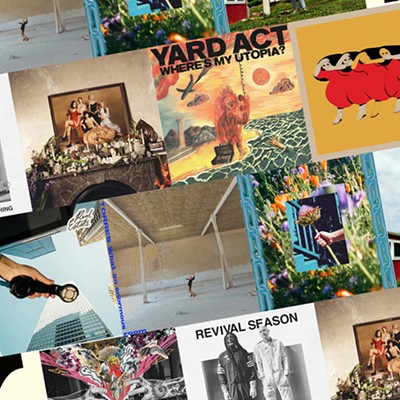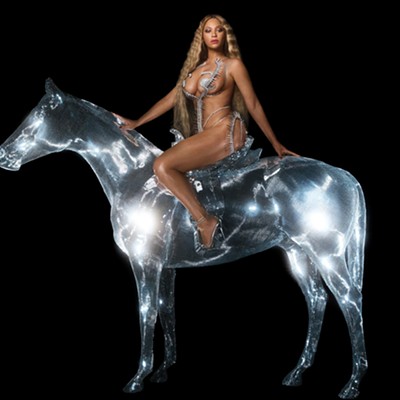How many times have you heard somebody say the following: "Oh, I like rock, rap, classical, jazz... everything really. Everything except country."
If you love American music, it hurts to hear, but imagine if you were Willie Nelson.
Nelson is country music. As a songwriter, he does it for the craft. As a storyteller, he does it for the image. As a philanthropist for farmers' rights (among many other causes), he does it for flesh and soil.
Unfortunately, the "country music" commonly observed on Country Music Television (CMT) or your Clear Channel country radio station bears almost none of his influence. This kind of country is pop country, and it requires of its practitioners nothing more than sex appeal and the ability to sing cookie-cutter pop in a twangy accent. It is rigid and prescribed. Willie Nelson has nothing to do with this.
The same degree of artifice exists in all forms of pop art, but by and large, pop country stars are trained in that old Red State ideology: if you act smart, you cannot be trusted, so your best bet is to keep it slow and simple. The other side is equally guilty of course. Gilmore Girls -- bad pop art for Blue State people -- flatters its audience's acumen with pretentious dialogue. The point of the performance, whether it's Alan Jackson admitting, "I don't think I can tell you the difference 'tween Iraq and Iran," or Lorelai name-dropping philosophers in a corner-store conversation, is to put the audience at ease. It is formula. Willie Nelson has absolutely nothing to do with this.
The salacious bits of Willie Nelson lore, like the whole smoking-a-joint-in-the-White-House thing, are true but don't make him the independent icon he is. Instead, it is the clarity with which he follows nobody's script but his own that makes him an American hero.
When Willie teamed with Toby Keith, country's too-dumb-to-be-serious King of Image, for the pop country smash (and CMT Best Video of 2004) "Beer For My Horses," Blue Staters felt betrayed. Two years later, he straight-facedly covered "Cowboys Are Frequently, Secretly Fond of Each Other," betraying legions of Red State homo-haters.
Nelson comes from an era before the underground/mainstream split, a schism created by the general public's coming to understand the relationship between art and commerce. At its most reactive, the underground ethos strictly maintains that money is evil and art should be made for expression and communion, but that -- as Willie has taught us -- is clearly stupid. He tried to live outside America's money system, out of the game, off the grid. Eventually he had to pay taxes.
The offhanded way he paid back his $16.5 million debt, a double album called The IRS Tapes: Who'll Buy My Memories?, set a mature precedent for all types of independent thinkers: You have to play the game, but you can make up your own rules. Willie ushered many such thinkers through the na & iuml;ve, hippie-fied belief that you can free your mind and drop out of society.
Farm Aid is his baby: he wants farmers to get paid fairly and grow hemp. He owns fuel plants: he wants truckers to use biodiesel. If there is a natural disaster, Willie organizes a benefit concert. He is a man of action, and his scrappy, hands-on style inspired a DIY movement among country musicians.
Not only is Willie old enough to represent American tradition, he's young enough to represent its willful undoing. He's about claiming country music and America, but he's also about reclaiming it. He is proud to inherit his plot of land, but he tills it as he sees fit.
That's the dualism that aligns him with Son Volt, Drive-By Truckers and Old 97s. Conflating country music and our country in general, these groups share something inherited -- soul, history, song, geography -- that is distinctly American. They are unified by a romantic want to discover and claim their Americanism. It is through Willie that they've learned the realistic flipside: If you want a home in America, you've got to build your own.
Old 97s, like Son Volt, rock too hard for traditionalists. But listen to Rhett Miller and Jay Farrar wail about killing themselves with whiskey and tell me that's not country. They are brothers in sad beauty. Drive-By Truckers, too, though they are mostly "alt" because they make concept albums and have a developed sense of humor, take special care in examining beautiful losers, dead-end loves and broken lives. It's the realization that someone else holds the cards -- that the system is bigger than you, that there is a hell of a storm coming and it just might kill you -- that resonates in country music. The total acceptance of perpetual struggle, for love, life and art, puts a peculiar strain on a person. You can see it and feel it. If you've heard Willie Nelson's delicate, keening vocals cut through pain like 10-ton feather, you know what I mean.
Willie Nelson stands for everything that's right about country music and much of what's right about America. He's living proof that freedom, when it's done right, looks and sounds like the death of innocence.
So if you tell me that you don't like country, I get where you're coming from. You just don't realize what you're saying.
WHY WASHINGTON?
There was a definite thrum around the Inlander offices when we first heard Willie was bringing his annual Fourth of July Picnic to the Gorge. Whether young or old(er), most of us seemed to know the event's lineage. Willie's been hosting the picnic in various locations since the mid-'70s, but this would be the first time it happened outside the Lone Star State. That, at least, seemed significant, and we all went about wondering, "how'd LiveNation get him here?"
Turns out, it's nothing too sexy. According to Willie's publicist, Elaine Schock, "It just sorta happened." Dude was just going to be in the area, playing a benefit show in Montana on July 3 that may or may not have been the work of Dave Letterman (there are rumors), so he decided to move it up here for a year.
Schock even debunks the idea that the Fourth of July Picnic is some great Texas tradition. "It hasn't always happened, not every year or anything." It's just a thing he does -- like seemingly everything else in his career -- where and when he pleases. -- LUKE BAUMGARTEN














